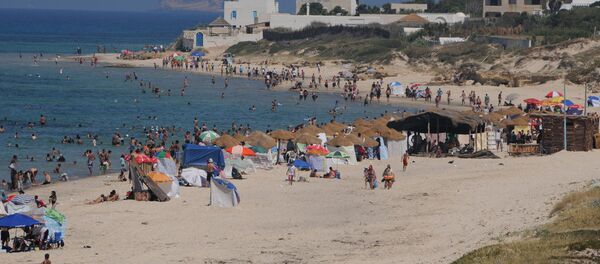It was just last year that the popular Spanish seaside resort of Cambrils came under attack, mere hours after a man plowed into a crowd in Barcelona, killing 13 people.
READ MORE: Van Attack in Barcelona Kills 13 People, Similar Attack Attempted in Cambrils
Now, allegations have surfaced that British born terrorist Samantha Lewthwaite, also known as the 'White Widow', is recruiting suicide bombers to target holidaymakers in Europe.
Among the potential targets, named in the Daily Star 'Lewthwaite report', were Spanish Costas, Greece, Turkey, the Canary Islands and Cyprus.
Cyprus police have dismissed the allegations of potential attacks of tourists on its soil, saying there was no reason for concern.
Stroll along the Kato #Pafos waterfront and harbour and enjoy some amazing views of the #Mediterranean. #VisitCyprus #Paphos
— VisitCyprus (@visitcyprus) July 7, 2018
Pic by @lightley_travels pic.twitter.com/NF7yZsyFZB
According to expert on terrorist financing and author Loretta Napoleoni, terrorism doesn't go on a summer break.
"It is easy to make a big impact when it comes to holiday destinations. This is meant to be the most relaxing place. The impact of somebody being blown up on the beach is somehow bigger than in the city. In the city, we know by now that we are targets. But on a holiday resort, you feel safer psychologically," Ms. Napoleoni told Sputnik.
The current official foreign travel advice by the UK government suggests that terrorist attacks in Cyprus, Greece can't be ruled out and are likely to occur in Spain and Turkey.
"There's a heightened threat of terrorist attack globally against UK interests and British nationals, from groups or individuals motivated by the conflict in Iraq and Syria. You should be vigilant at this time," the advice on both Cyprus and Greece reads.
Mediterranean beaches are among top summer holiday attractions for tourists from Europe and around the world. In 2015, more than 9 out of every 10 nights spent in the tourist accommodation establishments of Malta, Greece and Croatia were located in coastal areas.
Good morning from Mykonos #Greece #VisitGreece #Travel #ttot pic.twitter.com/kQvdRaKDu7
— Visit Greece (@VisitGreecegr) July 18, 2018
Speechless and in love. That's how we felt when we saw Es Pontàs in Mallorca. How about you? @BalearicTour #EsPontàs #Mallorca #VisitSpain #SpainIn10Sec #SpainCoast pic.twitter.com/Ep488fmgey
— Spain (@spain) July 17, 2018
Let your adventurous spirit discover the secret coves around Patara and experience the magic of #BlueFlag waters. pic.twitter.com/r8qWNGzl3e
— Turkey.Home (@Turkey_Home) April 26, 2016
Tourist destinations such as beach resorts, where "protective security is perhaps in its most limited state," allows terrorists to take advantage of these deregulated spaces — Professor Tahir Abbas, visiting Visiting Senior Fellow at the London School of Economics and former Senior Researcher with the Home Office and the Ministry of Justice, told Sputnik.
Terrorists seek a particular response, which is international attention, said Dr. Abbas. By targeting beach resorts, they can achieve their goal, as "many of the victims are likely to be foreign."
In the case of Spain, the UK government informs that Spanish police have disrupted a number of groups suspected of recruiting individuals to travel to Syria and Iraq from 2015 to the present date.
"Some of them expressed an intention to carry out attacks in Europe," it added.
Jetting off on holiday this summer? ✈️ 🏖 😎
— Terrorism Police UK (@TerrorismPolice) July 6, 2018
3 things to do before you travel:
✅ Check Foreign Travel Advice
✅ Sort your travel insurance
📽️ Watch our holiday safety film pic.twitter.com/RIFYlp6s5G
A number of terrorist groups are active in Turkey, says the UK Foreign Office, calling on travellers to be "be vigilant around significant religious occasions (including the holy month of Ramadan) and public holidays; terrorist groups sometimes call for attacks around these times."
Overall, according to the British policing authorities, chances of being involved in a terror attack remain low. However, they urge holidaymakers travelling abroad in the summer to watch a new video "designed to help keep them safe in the event of an incident."
🌞 Stay safe this summer🌞
— Staffordshire Police (@StaffsPolice) July 16, 2018
Before you head off on holiday this summer:
— Check the latest UK Foreign Office Travel Advice for the country you are visiting ✔️
— Make sure you have adequate travel insurance –check the small print✔️
— Watch this holiday safety film ✔️ pic.twitter.com/LWBYkBxElb
Economic Impact
In Italy, younger generations tend to be influenced more than older generations in their holiday choices, while in Spain residents were more likely to avoid planning summer holidays to Turkey and Egypt in 2016 due to the fear of terrorism.
Dr. Abbas told Sputnik that improved surveillance measures could help tackle the terror threat in European holiday destinations.
"Terrorists have every intention to disrupt, disturb and denormalize everyday situations involving members of the public, and holiday destinations are significant opportunities for those who remain the most motivated," Dr. Abbas added.
EU residents take more than a billion vacation trips every year, making tourism a major economic activity in the European Union with wide-ranging impact on economic growth, employment, and social development.
The views and opinions expressed in this article are those of the speakers and do not necessarily reflect those of Sputnik.






